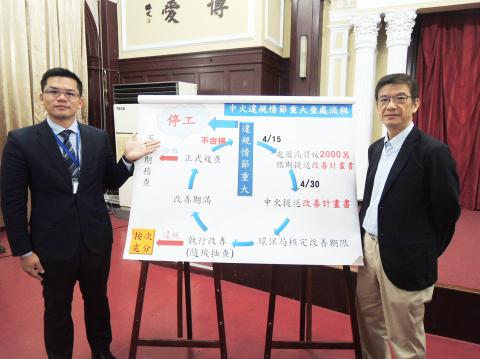The Taichung City Government yesterday fined the Taichung Power Plant NT$20 million (US$647,962) for poor management of industrial wastewater.
The Taichung Environmental Protection Bureau gave the coal-fired plant until April 30 to come up with a proposal to ameliorate the situation, bureau Director-General Wu Chih-chao (吳志超) said in a statement posted on the city government’s Web site.
The plant, which is run by state-owned Taiwan Power Co (Taipower, 台電), was fined in accordance with Section 40 of the Water Pollution Control Act (水污染防治法), Wu said.

Photo: CNA
It is the highest fine ever imposed on a state-owned enterprise, the statement said.
A test conducted on March 21 by the bureau found that wastewater from the plant’s No. 1 to No. 4 generators contained nitrate nitrogen levels that exceeded the allowable limit, Wu said.
Two other tests carried out earlier this year on generators No. 5 to No. 8 also turned up levels that exceeded the limit, he said.
Taipower in a statement said that high nitrate nitrogen levels were mainly caused by the plant’s focus on preventing air pollution, resulting in a lack of capacity to manage water pollution.
The utility said it respects the city government’s decision.
“We need to resolve the problem of wastewater first. We have yet to discuss whether to appeal the fine,” Taipower spokesman Hsu Tsao-hua (徐造華) told the Taipei Times by telephone.
The company must pay the fine by May 15, the Chinese-language Liberty Times (sister newspaper of the Taipei Times) reported, citing Taichung Information Bureau Director-General Wu Huang-sheng (吳皇昇).
To demonstrate its willingness to lower nitrate nitrogen levels in wastewater, the plant has halved the output of generators No. 1 to No. 4, Taipower said.
The plant has also readjusted an operating meter for flue gas desulfurization equipment to reduce the level of nitrogen oxides, it said, adding that round-the-clock supervision of the generators is being enforced to regulate the quantity of ammonia injection.
Generator No. 4 would be shut down to test equipment and improve wastewater management, Taipower said, adding that adjustments would be made to generator No. 3 to improve air pollution controls.
Taipower reiterated the importance of the plant, which it said plays a key role in ensuring a steady power supply for the nation.
The timing for the generators to return to normal generation levels would depend on wastewater conforming to regulations, it said.
The company said it hopes that improvements to the plant’s wastewater management could be made by early next month, as the nation’s electricity consumption is to greatly increase afterward.
It would maintain a low operating reserve margin of 6 percent over the next 10 days, as there have been no forecasts of abnormally hot weather, Taipower said, adding that and adjustments would be made according to the weather and electricity consumption.

Hon Hai Precision Industry Co (鴻海精密) yesterday said that its research institute has launched its first advanced artificial intelligence (AI) large language model (LLM) using traditional Chinese, with technology assistance from Nvidia Corp. Hon Hai, also known as Foxconn Technology Group (富士康科技集團), said the LLM, FoxBrain, is expected to improve its data analysis capabilities for smart manufacturing, and electric vehicle and smart city development. An LLM is a type of AI trained on vast amounts of text data and uses deep learning techniques, particularly neural networks, to process and generate language. They are essential for building and improving AI-powered servers. Nvidia provided assistance

DOMESTIC SUPPLY: The probe comes as Donald Trump has called for the repeal of the US$52.7 billion CHIPS and Science Act, which the US Congress passed in 2022 The Office of the US Trade Representative is to hold a hearing tomorrow into older Chinese-made “legacy” semiconductors that could heap more US tariffs on chips from China that power everyday goods from cars to washing machines to telecoms equipment. The probe, which began during former US president Joe Biden’s tenure in December last year, aims to protect US and other semiconductor producers from China’s massive state-driven buildup of domestic chip supply. A 50 percent US tariff on Chinese semiconductors began on Jan. 1. Legacy chips use older manufacturing processes introduced more than a decade ago and are often far simpler than

STILL HOPEFUL: Delayed payment of NT$5.35 billion from an Indian server client sent its earnings plunging last year, but the firm expects a gradual pickup ahead Asustek Computer Inc (華碩), the world’s No. 5 PC vendor, yesterday reported an 87 percent slump in net profit for last year, dragged by a massive overdue payment from an Indian cloud service provider. The Indian customer has delayed payment totaling NT$5.35 billion (US$162.7 million), Asustek chief financial officer Nick Wu (吳長榮) told an online earnings conference. Asustek shipped servers to India between April and June last year. The customer told Asustek that it is launching multiple fundraising projects and expected to repay the debt in the short term, Wu said. The Indian customer accounted for less than 10 percent to Asustek’s

Gasoline and diesel prices this week are to decrease NT$0.5 and NT$1 per liter respectively as international crude prices continued to fall last week, CPC Corp, Taiwan (CPC, 台灣中油) and Formosa Petrochemical Corp (台塑石化) said yesterday. Effective today, gasoline prices at CPC and Formosa stations are to decrease to NT$29.2, NT$30.7 and NT$32.7 per liter for 92, 95 and 98-octane unleaded gasoline respectively, while premium diesel is to cost NT$27.9 per liter at CPC stations and NT$27.7 at Formosa pumps, the companies said in separate statements. Global crude oil prices dropped last week after the eight OPEC+ members said they would